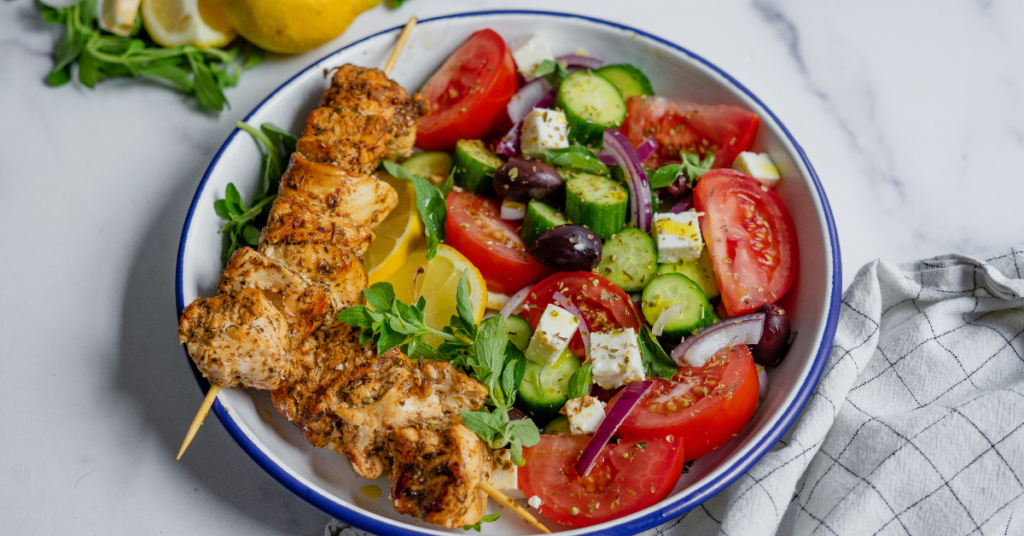Raise your hand if you’ve heard of Celiac disease! No? How about heard of someone going Gluten-free? There we go. We all know gluten-free now. Heck, if you’ve been to Brooklyn recently you know about gluten-free because I think the entire borough itself has outlawed gluten.
Way too easy jokes about Brooklyn aside, gluten-free is a mainstream thing now. Going gluten-free is something that just about everyone is familiar with. By everyone, I even mean my early-70’s grandmother who still doesn’t even have cable tv.
I, for one, am really happy about that. I think it’s an outstanding thing to see that so many people are more aware of some of the things that might disagree with their stomachs, even if gluten-free has kind of been co-opted into a status symbol of sorts. While the phrase “gluten-free” is a well-known marketing phrase now, there’s still a lot we don’t know. A lot we don’t know about gluten-intolerance, our gut, and why some of us might deal with debilitating stomach pains and cramps on a very regular basis.
So let’s get the really important stuff out of the way first: eliminating gluten isn’t a cure-all when it comes to your gut health. Eliminating gluten is a very specific prescription for a very specific autoimmune disease, called Celiac disease. I know this because my 92-year-old great grandfather has been Celiac since 2006, before gluten-free was a billion dollar industry. See, eliminating all gluten didn’t solve all of the stomach problems back when he was a spry 79-year-old. It helped a little bit, but he still kept dealing with intense stomach issues for years afterward. In order for my grandpa to take care of his debilitating stomach cramps, there had to be other options for him.
That’s where FODMAPs come into play.
Gut health is so hot right now. Any corner you turn on the Internet you’re bound to run into some folks spouting off about their gut health, their microbiome, their bacteria, how those things play into their immune system, mental health, and more. And in almost every single gut health discussion that happens online, you’ll see one acronym continually show up:
FODMAPs.
There’s no doubting that people looking to take care of their gut health is an overall good thing, but there’s also something important to remember here: gut health is such a new topic for so many of us that when we talk about gut health, we hardly know exactly what we’re talking about.
See, there are a lot of us who live in discomfort every day thanks to our gut. Maybe it’s accidentally being exposed to gluten because the waiter forgot to tell us it was in soy sauce, or eating a sandwich that you thought was going to be okay, only to find that your stomach seriously disagreed with you only 20 minutes later. Whether it’s constipation, constant stomach cramps, diarrhea, or any of the other not-so-fun-to-talk-about things we all talk about when we’re talking about our digestion. It’s this pain, discomfort, and treating certain syndromes and diseases like IBS, Inflammatory Bowel Disease, and Crohn’s, that FODMAPs have utility with. But what exactly are FODMAPs? And why do they matter for those of us who are looking to live a slightly more comfortable and pain-free life?
Before we go any further, I want to make it very clear that I am not telling you right now to try out a low FODMAP approach. Gut health and gut discomfort are highly individualized things and can leave you feeling confused, helpless, and unsure of what in the world is even okay for you to eat. Nothing about this article is meant to be prescriptive. Instead, I want this to be a jumping off point for many of us. A chance for us to learn about FODMAPs, how they can interact in the gut and impact gut health, and ideally serve as a chance for you to get a little bit more curious to learn more — especially if you’re someone who deals with intense stomach pains or discomfort.
FODMAPs stands for:
- Fermentable
- Oligosaccharides
- Disaccharides
- Monosaccharides
- And Polyols
I know, handy little acronym, right? A handy little acronym with a lot of big words. It came from Dr. Sue Shepherd at Monash University in Melbourne, Australia — one of the same people who first pioneered the low-FODMAP approach in treating IBS, where they’ve helped ¾ of those who suffer from IBS diminish their symptoms with a low FODMAP approach. If you remember back to this blog where we talked about sugar, then some of these names should sound kind of familiar. All of these things in the acronym (aside from the polyols, which are sugar alcohols) are shorter chain carbohydrate structures that ferment more rapidly in the gut, and in that fermentation process, draw more gas and water into the gut to aid in that fermentation process.
To see what that looks like in action, check out the above video. It’s a handy little video out of Monash University that not only details some of the finer points of our digestive system but illustrates how that fermentation process actually happens. I think it’s an important watch and an important thing to understand because it’s in that fermentation process where many of us who deal with stomach pains, cramps, constipation, diarrhea, etc. find the source of all that discomfort.
What are some of the more common sources of FODMAPs?
An unsettling truth about FODMAPs is that they’re everywhere. Now, that’s not meant to shock or scare you. FODMAPs aren’t toxins and they aren’t things that are slowly killing all of us. FODMAPs are everywhere because they’re natural components of food.
- Fructose – the sugar that is commonly found in fruits and veggies
- Lactose – the sugar that is commonly found in dairy
- Fructans – a compound similar to fructose that’s found in many vegetables and grains
- Galactans – a compound found primarily in legumes
- Polyols – sugar alcohols that are used as low-calorie sweeteners and chewing gum, like xylitol and sorbitol
Notice what isn’t on that list? Gluten! The very thing we started this whole blog with. That’s because gluten is actually a protein (albeit a very small one!) and not a carbohydrate. Ironically, someone who is Celiac might be more than okay with many of the things that are considered a FODMAP, and someone who struggles to break down more fermentable carbohydrates might actually do fine with gluten. Even better: people who have lived with Celiac, undiagnosed, can actually see a number of improvements to their symptoms with a low FODMAP approach because of the way in which Celiac can stunt the growth of healthy intestinal villi. There’s no clear answer, and when it comes to gut health and finding something that allows you to feel good, it’s hard to find a world that gets more individualistic than this one. Aren’t the nuances of gut health fun?
Oh, and as if things hadn’t gotten weird enough.
Someone that is sensitive or intolerant to something on the FODMAPs list isn’t automatically intolerant or sensitive to ALL of the things on that list. Someone might do well with fructose, but lactose causes intense cramping and digestion problems. Another person might do very well breaking down galactans. As such, they’re able to eat all the legumes they want while not being able to get in the same neighborhood as polyols, without being brought to their knees from stomach cramps.
But we’re not getting weird yet. See, FODMAPs are really interesting because sometimes when it comes to our inability to breakdown or process foods, it’s not even that we can’t handle that specific food, it might be the quantity. With these, for example, it’s not uncommon to see that someone might have a little bread in the morning, some asparagus at lunch, and then cabbage at dinner. All day long that person might’ve been okay, but once they had their cabbage their stomach suddenly decided that it’d had enough it was high time to make its displeasure known. Does that mean this person just absolutely cannot process cabbage? Possibly. But it’s far more likely that this person just had too many fructans in a given day and that was enough to send their digestive system haywire.
Like I said above, it’s a highly individualized world.
So what is a low FODMAP diet?
The Low FODMAP approach was developed by Dr. Sue Shepherd and Dr. Peter Gibson at Monash University in an effort to treat individuals with IBS. When we’re talking about a low-FODMAP diet, we’re almost always talking about someone who is looking to treat some digestive issue such as IBS, Inflammatory Bowel Syndrome, Crohn’s, and other digestive system issues. Though you don’t have to have an official diagnoses for you to try a low-FODMAP approach. If you’re someone who does deal with digestive issues, regular stomach pain, irregular bowel movements, diarrhea, etc. then a low-FODMAP approach could be something that winds up being very useful.
But what is the low FODMAP diet in action?
Low FODMAP diets involve near total elimination of these foods for 3-8 weeks, as best as you can. I’d love to put together a handy little list that you can print out and carry with you everywhere you go, but if you click that link above or look at this one, you’ll see that when it comes to compiling a list of FODMAPs it’s not exactly the simplest thing. Like I said earlier, they’re everywhere.
When it comes to actually implementing the low FODMAP approach, I tend to want to lean towards the longer side of the spectrum, but it’s not completely necessary. For many people, a low FODMAP approach for 3 entire weeks can be enough, whereas others might prefer longer.
What is necessary is that we understand that when talking about eating this way we’re not talking about eating in the same way that we do when we’re talking about dieting. Both are controlled and regulated systems of eating, both can be done together, but eating a low FODMAP diet in the elimination phase isn’t something that should be done on a whim. You can count all your macros since you’re still eating food, but It’s an intensive approach that often requires drastically changing our lives during that period of time.
In order to really try and find some answers about why you’re feeling so poor, we want to have a significant amount of time without much of these compounds at all to allow your gut to heal before reintroduction. This means that for 3-8 weeks, we are actively working to eliminate as many of the potential issues as we possibly can. That might mean eating more boring and bland foods, many of the exact same meals, and reducing a lot of the variability and palatability in your diet.
There are no intentional cheat days, off days, or days that you take off this approach because you feel like it.
I can’t stress the above point enough. A low FODMAP approach to identify potential food intolerances or things that cause issues for your digestive system needs to be a highly controlled and regulated period of time. The low FODMAP approach is NOT meant to be a long-term solution, and it’s not a system of eating that you’re expected to adhere to for an extended period of time. It’s merely a short-term period of elimination, followed by a period of reintroduction, so that you can learn more about your body, what makes it feel good, what makes it feel bad, and then adjust accordingly so that you can live a happier, healthier, and more comfortable life.
Integrity in the elimination part of a low FODMAP diet is highly important. If you’re eating a diet that has plenty of whole, nutrient dense, and unprocessed foods that are all steering clear of the FODMAP categories, you’ll still be ingesting some FODMAPs. They’re everywhere and they’re impossible to get away from. This is why we stress being honest in your approach and leaning into the idea of eating as boring as possible for 3-8 weeks. You won’t completely eliminate them altogether, but you will minimize your exposure to them, and when trying to determine what exactly is causing your gut pain, that can be tremendously helpful.
The reintroduction phase:
After 3-8 weeks of virtually no FODMAPs the reintroduction phase can start up, and this is where things can get really fun and really weird. If you think of the elimination phase of the low FODMAP approach like cutting, where there’s a measurable goal, such as: go X weeks without FODMAPs, hit my numbers, see changes on the scale, etc. then this can feel a lot like maintenance for some of us. There’s less of an expected outcome, things are more ambiguous, and we have to be more willing to listen to ourselves and our bodies. The reintroduction phase could look something like:
After 3-8 weeks on a low FODMAP diet, the reintroduction phase begins. After 3-8 weeks of the low FODMAP approach, you can start by:
- Reintroduce fructose (or what you want to try) in week 1. Don’t start by reintroducing ALL the fructose though. Pick 1-2 higher fructose foods and try to eat those in a controlled manner. Pay attention to if those cause any discomfort or digestive issues. If there’s no side effects or adverse issues for that week, then reintroduce the next thing you want to try. Following that same process until you’ve reached the end of the line and ideally:
- You’ll have identified the food group that was causing you pain and discomfort because your pain and discomfort WILL become more noticeable after having spent weeks away from eating that food.
- You’ll have also reintroduced everything else, helping identify that those foods are not the culprit, which means those are foods that you should be able to comfortably eat without issue, and actually have a clearer understanding around the foods that work well for you and the foods that don’t work so well.
Is a low FODMAP approach for you?
First off, a low FODMAP approach is NOT for you if you’re thinking about eating that way for the rest of your life. Seriously. I said it above and I’m reiterating Dr. Sue Shepherd, the creator of the low FODMAP approach when I say that this is not meant to be a long-term approach. Much like weight loss, if done well and with care, you should only have to take one real attempt at the low FODMAP approach.
Additionally, I want to be very careful in making sure that anyone reading this knows that I’m not prescribing this approach and intervention to you. I hope I’ve made it clear that following a low FODMAP diet is no small thing. It requires quite a bit of planning, diligence, consistency, and a willingness to cancel a lot of your plans that might involve food for a couple of months. Additionally, this is NOT an approach to be haphazardly used for when you’re looking to jumpstart your weight loss or anything like that.
This is a legitimately restrictive approach to eating, and there are a number of reasons behind that restrictive approach, none of which involve this being the cure for someone’s weight loss woes. Now, all of that being said, some people that might find help from a low FODMAP diet and reintroduction phase could include:
- Those who deal with IBS-c or IBS-d
- People who deal with Inflammatory Bowel Disease
- Those who suffer from Crohn’s
- If you have intense and debilitating stomach cramps, especially at random
- Sudden and/or constant urges to use the restroom
- Uncontrollable gas or flatulence
Essentially, anyone that clearly knows there’s something happening in your gut, it might be worth trying out and talking to your coach about. Studies have consistently shown that a low FODMAP approach can help on all of these fronts, but I can’t stress the talking to your coach bit enough, either. I’d even go as far as to say that trying out a low FODMAP approach under the guidance of a coach would be one of the best choices you can make. Like we pointed out earlier, a low FODMAP diet and counting your macros aren’t mutually exclusive. The two can happily work together. But much like having a coach to adjust and troubleshoot your macros with, a coach who can help walk you through the elimination, and more importantly, the reintroduction phase, of a low FODMAP diet could be an extremely useful way to help you get more support, stay more on track, and get a more objective eye at some of the things that you experience in this process.
I’m not here to prescribe a low FODMAP approach to anyone. I’m here to help us all understand just how incredibly nuanced and complicated digestive health can be, along with providing one of the more common and research-backed solutions when it comes to helping all of us learn a little bit more about what our bodies can digest and how we can continually make food something that complements our life, not controls it.









